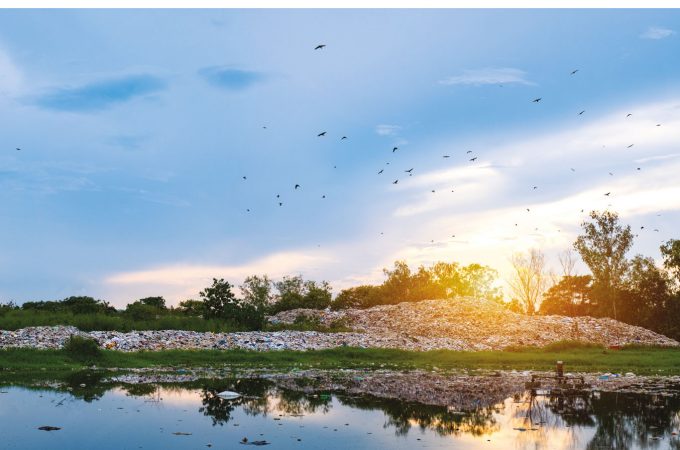MARINE ENVIRONMENT
Canals, rivers and waterways are used for many purposes across the world. Such uses include tourism, transportation of goods and people, and depositing silt and waste into the ocean to name a few. Over the decades however, the amount of waste that has accumulated in waterways has become monumental.
TACKLING PLASTIC POLLUTION
Sashan Rodrigo sheds light on initiatives to clean waterways the world over
For example, Ministry of Mahaweli Development and Environment data suggests that Sri Lanka produces approximately 400 metric tonnes of plastic waste every day. Moreover, only 30 percent of the waste that’s transported from canals into the ocean returns to the shoreline – this means that 70 percent remains in the ocean.
Globally, we are not doing any better when it comes to addressing the issue of plastic pollution.
In fact, a report published by the University of Leeds projects that more than 1.3 billion tonnes of plastic is destined to be dumped on land and in our oceans between 2016 and 2040. These days, 10 percent of all plastic waste is said to be deposited in the ocean, which is estimated to be about 2.4 million tonnes.
is said to be deposited in the ocean, which is estimated to be about 2.4 million tonnes.
Waste has become a massive problem across the globe, leading to health and sanitation issues, revenue losses in the tourism industry, the degradation of marine ecosystems and countries being unable to use their waterways for transport purposes.
However, with such problems come solutions. Around the world, people have come up with unique solutions to tackle the waste problem impacting their waterways.
For instance, a tour company in Amsterdam possesses a fleet of 11 boats that is dedicated to fishing plastic and other waste from the capital’s network of canals. As a business engaged in the activity of ‘plastic fishing,’ Plastic Whale’s ultimate objective is to end the need for its services by cleaning up all of Amsterdam’s waterways.
The company’s boats are electric powered and manufactured from recycled materials that were fished from the city’s canals. Regular nets are used to clean out the plastic and other waste, with 40,500 bottles being fished from Amsterdam’s canals and 18,000 tourists helping out in 2019.
This model of including regular people in cleaning up waterways has worked to attract the attention of other organisations as well with many getting involved in the endeavour, most notably Starbucks. As a result, the culture has created what many refer to as ‘a badge of honour.’
Meanwhile, an organisation in the US has invented a non-chemical method for removing weeds from canals. The Aquatic Vegetation Rake (AVR) is made to fit an excavator; it is a large rake with stainless steel rods that form a basket equipped with 12 inch steel teeth to pull weeds out of canals without disrupting the flow of water.
Additionally, the product enables operators to collect trash and debris from the waterway, and is an environmentally-friendly solution as it removes weeds without the need for pesticides, which also saves companies money.
Initiatives to tackle the issue of plastic waste have also been launched in Sri Lanka. An example of this is a leading apparel manufacturer launching a pilot project to collect plastic waste with the installation of a floating trash trap in the Dehiwela Canal last year.
This project was launched through a public-private partnership with government agencies such as the Marine Environment Protection Authority (MEPA), the Western Provincial Council, the Environment Protection Division of the Sri Lanka Police and the Sri Lanka Land Development Corporation.
The development of this trash trap included the involvement of experts to make use of international knowledge while also gearing it to address Sri Lanka’s local environment. Collecting a minimum of 35 kilogrammes of plastic a day, the trap acts as a mesh fence both above and below the water to keep plastic from entering the ocean.
Additionally, the local community has been involved, taking part in the process to clean the canal and clear the waste once it has been collected by the trash trap. Similar to the initiative that was launched in Amsterdam, a designated member of the community is given a barge and other tools to clear the waste once it is collected. The collected waste is then handed over to the Western Provincial Council for proper disposal.
The hope is that this pilot project will lead to more collaboration with stakeholders to clean up the rest of the waterways in Colombo as well as those located around the island.
Marine plastic pollution has become a major problem around the world with plastic accumulating over time to block waterways, and pollute and degrade marine ecosystems.
But global solutions are being presented by individuals and companies. These solutions are geared to reduce the amount of plastic waste present in canals and waterways, subsequently reducing the amount of waste that ends up in the ocean. This shows that no matter the problem, there are solutions out there for those willing to find them.





